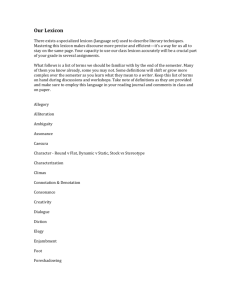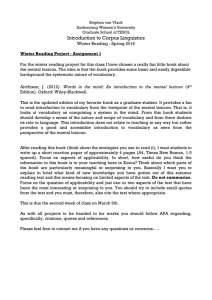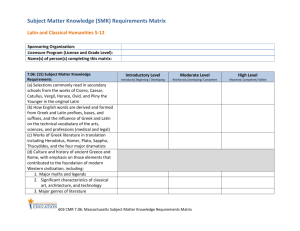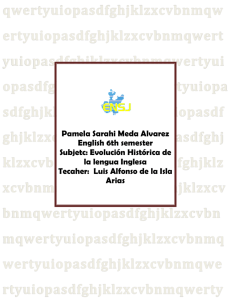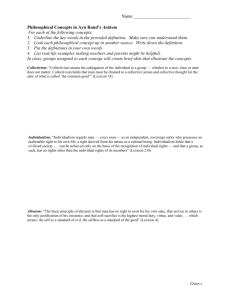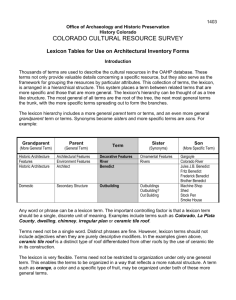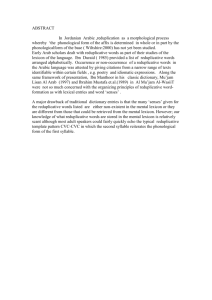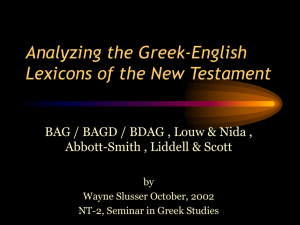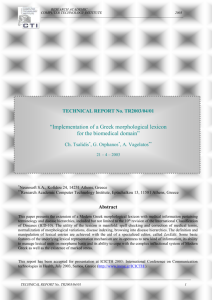Lexical Change
advertisement
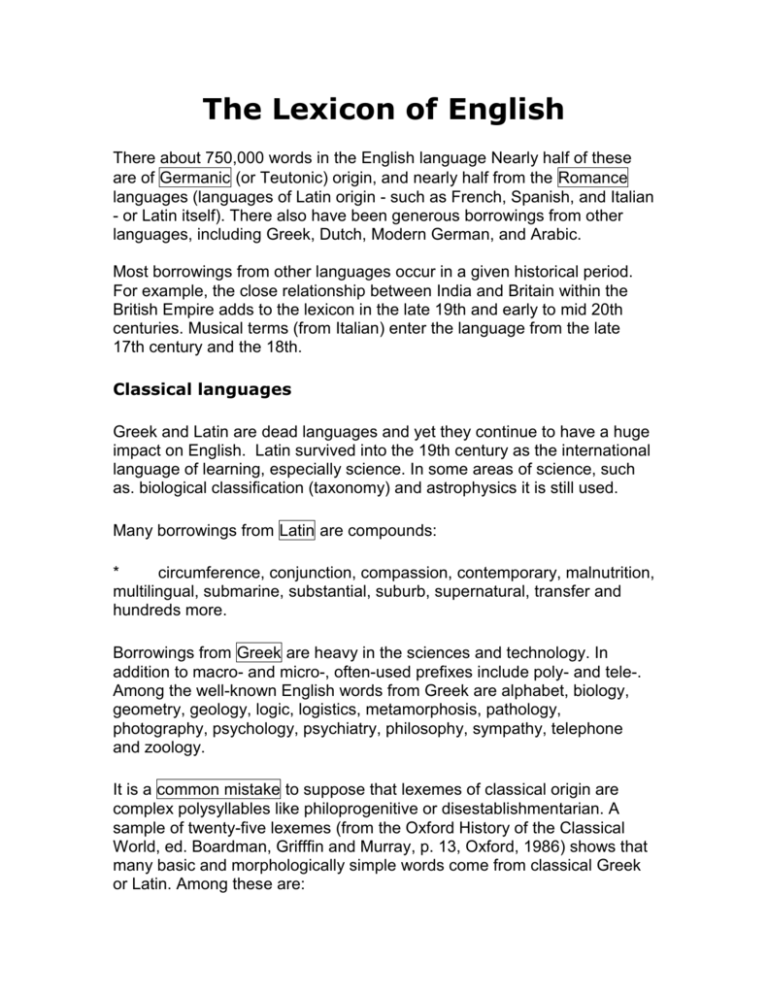
The Lexicon of English There about 750,000 words in the English language Nearly half of these are of Germanic (or Teutonic) origin, and nearly half from the Romance languages (languages of Latin origin - such as French, Spanish, and Italian - or Latin itself). There also have been generous borrowings from other languages, including Greek, Dutch, Modern German, and Arabic. Most borrowings from other languages occur in a given historical period. For example, the close relationship between India and Britain within the British Empire adds to the lexicon in the late 19th and early to mid 20th centuries. Musical terms (from Italian) enter the language from the late 17th century and the 18th. Classical languages Greek and Latin are dead languages and yet they continue to have a huge impact on English. Latin survived into the 19th century as the international language of learning, especially science. In some areas of science, such as. biological classification (taxonomy) and astrophysics it is still used. Many borrowings from Latin are compounds: * circumference, conjunction, compassion, contemporary, malnutrition, multilingual, submarine, substantial, suburb, supernatural, transfer and hundreds more. Borrowings from Greek are heavy in the sciences and technology. In addition to macro- and micro-, often-used prefixes include poly- and tele-. Among the well-known English words from Greek are alphabet, biology, geometry, geology, logic, logistics, metamorphosis, pathology, photography, psychology, psychiatry, philosophy, sympathy, telephone and zoology. It is a common mistake to suppose that lexemes of classical origin are complex polysyllables like philoprogenitive or disestablishmentarian. A sample of twenty-five lexemes (from the Oxford History of the Classical World, ed. Boardman, Grifffin and Murray, p. 13, Oxford, 1986) shows that many basic and morphologically simple words come from classical Greek or Latin. Among these are: act, art, beauty, colour, crime, fact, fate, fork, hour, human, idea, justice, language, law, matter, music, nature, number, place, reason, school, sense, sex, space, time Germanic and French lexis The lexicon of Old English is almost wholly Germanic - the exceptions are classical borrowings for the beliefs, organization and personnel of the church. It gives us such nouns as father, mother, brother, man, wife, ground, house, land, tree, grass, summer and winter, as well as abstractions like friendship. Old English verbs include bring, come, get, hear, meet, see, sit, stand and think. Most of our everyday essentials (articles, prepositions, conjunctions and pronouns) are found in Old English. French adds greatly to the lexicon in the Middle English period, under the Norman and Plantagenet royal houses. It gives us political terms: constitution, president, parliament, congress and representative. Also borrowed from French are: city, place, village, court, palace, manor, mansion, residence, domicile, cuisine, diner, cafe, liberty, veracity, carpenter, draper, haberdasher, mason, painter, plumber and tailor In modern times many terms relating to cooking, fashion, drama, winemaking, literature, art, diplomacy, and ballet also come from France. Other languages English has acquired many words from Spanish. Some of these came directly into English, especially in the age of sea travel and conquest: * cigar, armada, guerrilla, matador, mosquito, tornado Others have come to Spanish from one of the Indian languages of the Americas: potato and tomato, for example. Many Spanish words have entered American English from Latin America: canyon, lasso, mustang, pueblo, rodeo. Italian contributes to the English lexicon in many ways. The technical lexicon of classical music is almost wholly Italian: Allegro, brio, forte, piano, pizzicato, sotto voce and so on. In more recent times Italian has contributed to the English lexicon by giving us the names of many foods and foodstuffs: Ciabatta, chianti, lasagna, macaroni, pasta, spaghetti And the popularity or notoriety of organized crime, both in real life and in fiction, has given us another set of additions to the lexicon: Capo, cosa nostra, mafia, omerta and vendetta Arabic words have usually come into English by way of another European language, especially Spanish. Arabic was spoken in Spain during the period of the Muslim domination, in the early Middle Ages. Among the common English words that have come from Arabic are: alcohol, alchemy, algebra, alkali, almanac, arsenal, assassin, cipher, elixir, mosque, naphtha, sugar, syrup, zenith, zero Common words borrowed from other languages are: hammock, hurricane, maize, tobacco (Caribbean) gull (Cornish) howitzer, robot (Czech) brogue, blarney, clan, plaid, shamrock (Gaelic and Irish) ukulele (Hawaiian) bungalow, dungarees, jodhpurs, jungle, loot, polo, pyjamas, shampoo, thug (Hindi) paprika (Hungarian) bonsai, sumo, origami (Japanese) bamboo, ketchup, orang-utan (Malay) paradise, lilac, bazaar, caravan, chess, shawl, khaki (Persian) taboo, tattoo (Polynesian) flamingo, marmalade, veranda (Portuguese) mammoth, soviet, vodka (Russian) coffee (Turkish) flannel (Welsh) What is generally known as "lifestyle" contributes hugely to English - eg Chicken tikka masala. Reasons for change The lexicon does not change simply by growing. No single speaker is able to use all 750,000 words (most adult English speakers will use between 10,000 and 40,000), so … Over time one lexeme may replace another. The adverbial down to you (down to me, him, Fred etc.) effectively replaced up to you between the 1970s and the Millennium. And some words disappear from use. Hardly anyone wears breeches or pantaloons anymore. People rarely say verily or Lo! (except in badlywritten historical novels). To confuse things further, some lexemes return to fashion, so boffin (= clever person) and rag (= to tease) which were current in the 1950s, but rarely heard for several decades following, became current in the speech of English teenagers in the late 1990s. GB February 13, 2016 Based on Andrew Moore (http://www.shunsley.eril.net/armoore/contents.htm).
